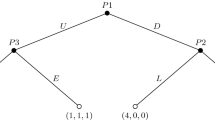Abstract
We investigate necessary and sufficient conditions for the existence of Bayesian-Nash equilibria that satisfy the Condorcet Jury Theorem (CJT). In the Bayesian game G n among n jurors, we allow for arbitrary distribution on the types of jurors. In particular, any kind of dependency is possible. If each juror i has a “constant strategy”, σ i (that is, a strategy that is independent of the size n ≥ i of the jury), such that σ = (σ 1, σ 2, . . . , σ n . . .) satisfies the CJT, then by McLennan (Am Political Sci Rev 92:413–419, 1998) there exists a Bayesian-Nash equilibrium that also satisfies the CJT. We translate the CJT condition on sequences of constant strategies into the following problem:
-
(**) For a given sequence of binary random variables X = (X 1, X 2, . . . , X n, . . .) with joint distribution P, does the distribution P satisfy the asymptotic part of the CJT?
We provide sufficient conditions and two general (distinct) necessary conditions for (**). We give a complete solution to this problem when X is a sequence of exchangeable binary random variables.
Similar content being viewed by others
References
Austen-Smith D, Banks JS (1996) Information aggregation, rationality, and the Condorcet Jury Theorem. Am Political Sci Rev 90: 34–45
Ben-Yashar R, Paroush J (2000) A non-asymptotic Condorcet Jury Theorem. Soc Choice Welf 17: 189–199
Berend D, Paroush J (1998) When is Condorcet Jury Theorem valid?. Soc Choice Welf 15: 481–488
Berend D, Sapir L (2007) Monotonicity in Condorcet’s jury theorem with dependent voters. Soc Choice Welf 28: 507–528
Berg S (1993) Condorcet’s jury theorem, dependency among jurors. Soc Choice Welf 10: 87–96
Berg S (1993) Condorcet’s jury theorem revisited. Eur J Political Econ 9: 437–446
Boland PJ, Prochan F, Tong YL (1989) Modelling dependence in simple and indirect majority systems. J Appl Probab 26: 81–88
Condorcet LM (1785) “Essai sur l’application de l’analyse à la probabilité des décisions rendues à la pluralité des voix”. De l’Imprimerie Royale, Paris
Dietrich F (2008) The premises of Condorcet’s jury theorem are not simultaneously justified. To appear in Episteme
Dietrich F, List C (2004) A model of jury decision where all the jurors have the same evidence. Synthese 142: 175–202
Duggan J, Martinelli C (2001) A Bayesian model of voting in juries. Games Econ Behav 37: 259–294
Estlund D (1994) Opinion leaders, independence and Condorcet’s jury theorem. Theory Decis 36: 131–162
Feller W (1957) An introduction to probability theory and its applications, vol I, 3rd edn. Wiley, New York
Feller W (1966) An introduction to probability theory and its applications, vol II. Wiley, New York (second corrected printing)
Grofman BG, Owen G, Feld SL (1983) Thirteen theorems in search of truth. Theory Decis 15: 261–278
Kuhn HW (1953) Extensive games and the problem of information. In: Kuhn HW, Tucker AW (eds) Contributions to the theory of games, vol II. Princeton University Press, Princeton, pp 193–216
Ladha KK (1992) The Condorcet Jury Theorem, free speech and correlated votes. Am J Political Sci 36: 617–634
Ladha KK (1993) Condorcet’s jury theorem in the light of de Finetti’s theorem: majority-voting with correlated votes. Soc Choice Welf 10: 69–85
Ladha KK (1995) Information pooling through majority rule: Condorcet’s jury theorem with correlated votes. J Econ Behav Organ 26: 353–372
Loève M (1963) Probability theory. D. Van Norstrand Company, Inc., 3rd edn. Princeton, New Jersey
McLennan A (1998) Consequences of the Condorcet Jury Theorem for beneficial information aggregation by rational agents. Am Political Sci Rev 92: 413–419
Nitzan S, Paroush J (1982) Optimal decision rules in dichotomous choice situations. Int Econ Rev 23: 289–297
Shapley LS, Grofman B (1984) Optimizing group judgemental accuracy in the presence of interdependencies. Public Choice 43: 329–343
Uspensky JV (1937) Introduction to mathematical probability. McGraw-Hill, New York
Wit J (1998) Rational choice and the Condorcet Jury Theorem. Games Econ Behav 22: 364–376
Young PH (1997) Group choice and individual judgements. In: Mueller DC (eds) Perspectives on public choice. Cambridge University Press, Cambridge, pp 181–200
Author information
Authors and Affiliations
Corresponding author
Rights and permissions
About this article
Cite this article
Peleg, B., Zamir, S. Extending the Condorcet Jury Theorem to a general dependent jury. Soc Choice Welf 39, 91–125 (2012). https://doi.org/10.1007/s00355-011-0546-1
Received:
Accepted:
Published:
Issue Date:
DOI: https://doi.org/10.1007/s00355-011-0546-1




